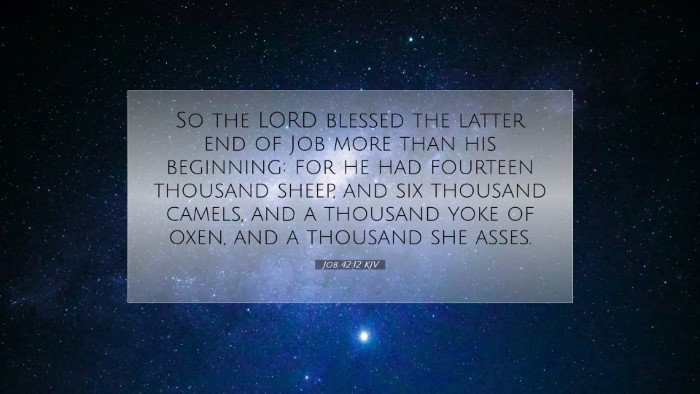Old Testament
Genesis Exodus Leviticus Numbers Deuteronomy Joshua Judges Ruth 1 Samuel 2 Samuel 1 Kings 2 Kings 1 Chronicles 2 Chronicles Ezra Nehemiah Esther Job Psalms Proverbs Ecclesiastes Song of Solomon Isaiah Jeremiah Lamentations Ezekiel Daniel Hosea Joel Amos Obadiah Jonah Micah Nahum Habakkuk Zephaniah Haggai Zechariah MalachiJob 42:12
Job 42:12 KJV
So the LORD blessed the latter end of Job more than his beginning: for he had fourteen thousand sheep, and six thousand camels, and a thousand yoke of oxen, and a thousand she asses.
Job 42:12 Bible Commentary
Commentary on Job 42:12
Job 42:12 (KJV): “So the LORD blessed the latter end of Job more than his beginning: for he had fourteen thousand sheep, and six thousand camels, and a thousand yoke of oxen, and a thousand she asses.”
Introduction
This verse marks a pivotal moment in the Book of Job, where the restoration of Job serves as a profound commentary on divine providence, justice, and the complexity of human suffering. The blessings bestowed upon Job in this verse illustrate not only God's sovereignty but also His capability to restore and bless abundantly those who endure trials faithfully.
Understanding the Context
The Book of Job narrates the dramatic journey of a man who faced immense suffering—losing his family, wealth, and health. Throughout the book, Job wrestles with understanding the nature of his suffering while maintaining his faith in God. By the time we reach Chapter 42, significant discussions between Job and his friends, as well as God's intervention, lead to Job's ultimate realization of God's omnipotence.
In this final chapter, the culmination of Job's trials results in a restoration by God that exceeds his original state, illustrating a divine scale of justice that often transcends human understanding.
Theological Insights
- The Nature of God’s Blessings: Matthew Henry emphasizes that God's blessings can come in unexpected forms, and they are often greater than human aspirations. This signifies the rich depth of God's mercy and grace.
- Divine Providence: Albert Barnes highlights that God's providence governs the outcomes of life, suggesting that even in suffering, God has a plan for restoration and blessing. This verse illustrates that even after severe tests, one can expect God’s redemptive work.
- Endurance and Faithfulness: Adam Clarke notes that Job's endurance through suffering serves as an example of unwavering faithfulness to God. This suggests that trials may eventually lead to blessings that far outweigh our initial conditions.
Analysis of Blessings in Job 42:12
The blessing of Job embodies both material and spiritual restoration. The specifics of Job's restored wealth—fourteen thousand sheep, six thousand camels, a thousand yoke of oxen, and a thousand she-asses—demonstrate a significant increase from his previous possessions. This abundance is indicative of God's favor in both societal and spiritual dimensions.
In examining the nature of these blessings, it can be understood that:
- Material Prosperity: The sharp increase in livestock indicates not only restored wealth but also signifies God's ability to change fortunes. This serves as a reminder to believers concerning the transient nature of earthly possessions.
- Covenantal Fulfillment: These blessings may also signify God’s faithfulness to His covenant relationship with His people. Job’s restoration underscores the theme of God's fidelity even when human perspectives falter.
Lessons for Believers
For pastors, students, and scholars, this verse offers several critical lessons:
- Hope Amidst Suffering: Just as Job was blessed abundantly after his trials, believers today are encouraged to cling to hope during suffering, trusting in God’s ultimate plan.
- Understanding God's Sovereignty: The restoration of Job invites reflection on God’s sovereignty in human affairs. It reassures believers of God’s control over their lives, even in tumultuous times.
- The Call to Humility: Job’s story teaches the importance of humility before God. The realization of God’s vast understanding compared to human reasoning is crucial for spiritual growth.
Conclusion
Job 42:12 encapsulates a profound truth about the nature of divine restoration. As highlighted by renowned commentators, the restoration of Job serves as a testament to God's unwavering love, mercy, and ability to bless abundantly despite human suffering. For believers, this verse offers hope and encouragement, affirming that even through the trials of life, God's blessings can far exceed our expectations.
As we contemplate this significant verse, may we be inspired to remain steadfast in faith, trusting in God's perfect timing and ultimate plans for restoration that align with His divine purposes.


